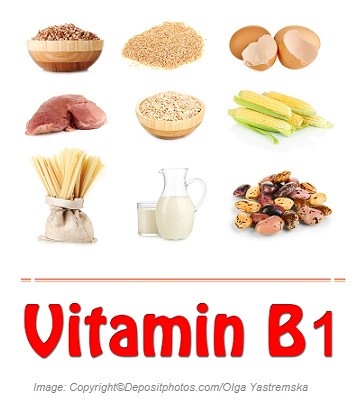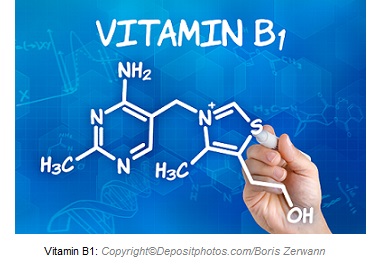 of carbohydrates, proteins, and fats.
of carbohydrates, proteins, and fats.
Functions of Vitamin B1:
- It plays a role in peripheral nerve conduction by helping the development of the myelin sheath, which covers the nerve.
- By acting as the coenzyme thiamine pyrophosphate (TPP), vitamin B1 has a crucial role in metabolizing glucose and generating energy (ATP).
- It is required for metabolizing alcohol.
- It helps with the synthesis of acetylcholine and gamma-aminobutyric acid (GABA). They are important neurotransmitters for normal brain function.
Food Sources and Absorption:
Foods high in vitamin B1 are yeast, wheat germ, organ meat, pork, beef, whole grains, legumes, nuts, and avocado. Milled rice and grains contain less thiamine. It is destroyed by cooking, especially boiling. Thiamine is absorbed well from the small intestine and stored in the liver, kidneys, and heart. The total thiamine storage of the body of an average person is about 28 mg with the highest concentrations in the liver, kidneys, heart, brain and skeletal muscles. Excessive thiamine is eliminated largely via urine and a trivial amount by sweating.
Tea, coffee (regular and decaffeinated), raw fish, and shellfish contain thiaminases, which destroy this vitamin. Alcohol, smoking, and sugar deplete the body from thiamine.
Athletic Benefits of Vitamin B1:
- It may delay fatigue and exhaustion in a prolonged training session.

- It may aid with jet lag.
- It may help decrease the production of lactic acid.
Non – Athletic Benefits of Vitamin B1:
The following conditions may benefit from thiamine:
- Beriberi disease.
- Anemia.
- Chronic fatigue syndrome.
- Alzheimer’s disease.
- Depression.
- Motion sickness (prevention).
- Fibromyalgia.
- Multiple sclerosis.
- Alcoholism.
- Hangover.
- Neuropathies.
- Canker sore.
- Cardiomyopathy.
- Heart failure.
- Diabetes.
- As an insect repellent.
- Infections.
- Neuromuscular diseases.
Deficiency of Vitamin B1:
Most cases of thiamine deficiency are the result of poor dietary intake. Manifestations of thiamine deficiency appear when dietary daily intake is less than 0.3 mg/1000 calories. Thiamine deficiency may induce anorexia, irritability and poor short-term memory at the initial stages. Prolonged deficiency of thiamine causes beriberi disease characterized by neuropathy, muscle weakness and wasting, swelling, enlargement of the heart and eye problems.
People at risk for thiamine deficiency are:
- Alcoholism.
- Chronic illnesses such as cancer.
- Chronic use of diuretics.
- Prolonged hyperemesis gravidarum (prolonged and excessive vomiting during pregnancy).
- After a bypass surgery for obesity.
- Poor diet and malabsorption.
- Heavy coffee drinkers.
Dosage and Side Effects:
The RDA for thiamine for adults is 1.2 mg per day. It is added to all multivitamins and  B – Complex. However, it is also available as tablets, softgels, and lozenges. The performance daily intakes (PDIs) for athletes and physically active adults are 50 – 300 mg.
B – Complex. However, it is also available as tablets, softgels, and lozenges. The performance daily intakes (PDIs) for athletes and physically active adults are 50 – 300 mg.
Although anaphylaxis has been reported after high doses of vitamin B1, no side effects and toxicity have been recorded from either food or supplements at higher doses.
Interactions:
The potential interactions are as follows:
- Diuretics: they reduce blood levels of thiamine.
- Digoxin: it may decrease uptake of thiamine by the heart.
- Phenytoin: this medication may lower blood levels of thiamine.
- Flavonoids (rutin and quercetin) and polyphenols (tannic acid, caffeic acid and chlorogenic acid): they may decrease blood levels of thiamine.

